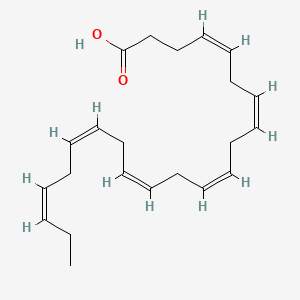DHA
Dha is a lipid of Fatty Acyls (FA) class. Dha is associated with abnormalities such as Atherosclerosis, Consumption-archaic term for TB, Chronic disease, Cardiovascular Diseases and Diabetes Mellitus, Non-Insulin-Dependent. The involved functions are known as Inflammation, Oxidation, fatty acid oxidation, Fatty Acid Metabolism and Lipid Metabolism. Dha often locates in Hepatic, Protoplasm, Mucous Membrane, Epithelium and outer membrane. The associated genes with DHA are IMPACT gene, FATE1 gene, GAPDH gene, THOC4 gene and SLC33A1 gene. The related lipids are stearidonic acid, Fatty Acids, Total cholesterol, Lipopolysaccharides and Dietary Fatty Acid. The related experimental models are Mouse Model, Transgenic Model, Animal Disease Models and Arthritis, Experimental.
References related to locations published in J. Nutr.
| PMID | Journal | Published Date | Author | Title |
|---|---|---|---|---|
| 10498759 | J. Nutr. | 1999 | Gee JM et al. | Consumption of fish oil leads to prompt incorporation of eicosapentaenoic acid into colonic mucosa of patients prior to surgery for colorectal cancer, but has no detectable effect on epithelial cytokinetics. |
| 11773511 | J. Nutr. | 2002 | Wu FC et al. | Docosahexaenoic acid is superior to eicosapentaenoic acid as the essential fatty acid for growth of grouper, Epinephelus malabaricus. |
| 10702585 | J. Nutr. | 2000 | Volker DH et al. | The eicosapentaenoic to docosahexaenoic acid ratio of diets affects the pathogenesis of arthritis in Lew/SSN rats. |
| 21525247 | J. Nutr. | 2011 | Escolano-Margarit MV et al. | Prenatal DHA status and neurological outcome in children at age 5.5 years are positively associated. |
| 21178081 | J. Nutr. | 2011 | Patterson RE et al. | Marine fatty acid intake is associated with breast cancer prognosis. |
| 19244379 | J. Nutr. | 2009 | Harris WS et al. | Towards establishing dietary reference intakes for eicosapentaenoic and docosahexaenoic acids. |
| 19022980 | J. Nutr. | 2008 | Lukiw WJ and Bazan NG | Docosahexaenoic acid and the aging brain. |
| 19640970 | J. Nutr. | 2009 | Shaikh SR et al. | Docosahexaenoic acid modifies the clustering and size of lipid rafts and the lateral organization and surface expression of MHC class I of EL4 cells. |
| 19864401 | J. Nutr. | 2009 | Friesen RW and Innis SM | Dietary arachidonic acid to EPA and DHA balance is increased among Canadian pregnant women with low fish intake. |
| 17311938 | J. Nutr. | 2007 | Schley PD et al. | (n-3) PUFA alter raft lipid composition and decrease epidermal growth factor receptor levels in lipid rafts of human breast cancer cells. |
| 18356340 | J. Nutr. | 2008 | Beli E et al. | Docosahexaenoic acid-enriched fish oil consumption modulates immunoglobulin responses to and clearance of enteric reovirus infection in mice. |
| 18492846 | J. Nutr. | 2008 | Cohen BE et al. | Red blood cell docosahexaenoic acid and eicosapentaenoic acid concentrations are positively associated with socioeconomic status in patients with established coronary artery disease: data from the Heart and Soul Study. |
| 22279134 | J. Nutr. | 2012 | Mozaffarian D and Wu JH | (n-3) fatty acids and cardiovascular health: are effects of EPA and DHA shared or complementary? |
| 22323767 | J. Nutr. | 2012 | Deckelbaum RJ et al. | Conclusions and recommendations from the symposium, Heart Healthy Omega-3s for Food: Stearidonic Acid (SDA) as a Sustainable Choice. |
| 23616502 | J. Nutr. | 2013 | Laird BD et al. | Dietary advice on Inuit traditional food use needs to balance benefits and risks of mercury, selenium, and n3 fatty acids. |
| 23303872 | J. Nutr. | 2013 | Depner CM et al. | Docosahexaenoic acid attenuates hepatic inflammation, oxidative stress, and fibrosis without decreasing hepatosteatosis in a Ldlr(-/-) mouse model of western diet-induced nonalcoholic steatohepatitis. |
| 23014495 | J. Nutr. | 2012 | Liu Y et al. | Fish oil enhances intestinal integrity and inhibits TLR4 and NOD2 signaling pathways in weaned pigs after LPS challenge. |
| 23739309 | J. Nutr. | 2013 | Liu Y et al. | Fish oil increases muscle protein mass and modulates Akt/FOXO, TLR4, and NOD signaling in weanling piglets after lipopolysaccharide challenge. |
| 24005609 | J. Nutr. | 2013 | Liu Y et al. | Fish oil alleviates activation of the hypothalamic-pituitary-adrenal axis associated with inhibition of TLR4 and NOD signaling pathways in weaned piglets after a lipopolysaccharide challenge. |
| 24285691 | J. Nutr. | 2014 | Höper AC et al. | Wax esters from the marine copepod Calanus finmarchicus reduce diet-induced obesity and obesity-related metabolic disorders in mice. |
